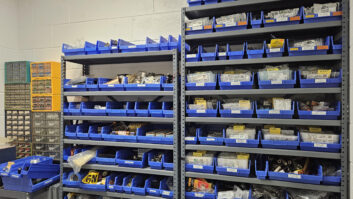
Did I see you at the NAB Show? I hope you made the time and effort to come, as an extension of the philosophy of lifelong learning we talked about last issue.
I’ll be interested to see how radio floor traffic differs now that most radio/audio booths are in the front end of the Central Hall. I suspect this will be a good change and we’ll sense a different feel to floor traffic as a result.
* * *
I raised my eyebrows at news that Harris has appointed SCMS as its exclusive reseller for its line of PR&E studio systems and consoles to the U.S. radio broadcast market. It was a reminder how much has changed in the dealer business since the days of Allied (not to mention the days of Pacific Recorders).
In case you missed our story on Radio World NewsBytes, SCMS becomes the only U.S. dealer of those products. “The agreement also confirms SCMS as the main U.S. dealer for Harris radio transmission sales,” the companies stated in the announcement. “Harris will continue to provide the majority of field service and technical support for its radio broadcast customers.”
A company spokesman emphasized to me that Harris will continue to employ its in-house sales staff to sell Harris products.
This is another step away from the way Harris Broadcast sold gear in the past. In 2007, as we reported then, it sold its third-party product resale business to SCMS, which hired two Harris employees, purchased the dealer inventory and had phone lines transferred to SCMS for non-Harris manufactured items. That ended a long era in which Harris was among dominant U.S. providers of “dealer products.” (Its core business building transmitters, consoles and other hardware remained.)
Also that year, Harris named approximately a dozen “channel partners,” at least some of which have since been selling PR&E products. Now, any who carried PR&E gear will no longer do so. Director of Strategic Marketing Rich Redmond sought to make clear that the change in arrangements does not reflect poorly on them.
“We are maintaining contractual relationships with a number of these companies for our Intraplex STL business, where we’ll continue to have an array of resellers, and SCMS will continue to make Harris PR&E studio products available for them to support their customers as well.”
Harris believes the new arrangement will extend its reach into small and medium-sized markets for single-item sales and help it sell systems and packages. Redmond also remarked on the reach of SCMS and the “savvy and skills” of its sales people. “We reflected on our studio sales strategy and decided to seek out a single representative with a nationwide presence that is well-educated, focused and able to support a longer selling cycle.”
In reply to my query about the ties between the two companies, SCMS owner Bob Cauthen replied, “The relationship has grown since we purchased the Broadcast Center from them three years ago this July. We continue to provide Harris many vendor items for their packages and we have been their largest reseller for transmission systems. They have wanted us to market their studio systems for some time.”
Knowing that SCMS has invested a lot in the dealer business (in a separate purchase in late 2008, it acquired Bradley Broadcast Sales), I was interested to hear that Cauthen views the radio equipment industry as a “very mature” one.
“Many would say it is actually shrinking, especially with the demise of many major groups. I think a lot of us in the industry predicted this would eventually happen because the purchase prices of many stations just were too high with respect to ad revenues.
“It will get worse if the industry does not embrace IBOC (whether you like the technology or not), because Internet radio and variations of that will pass us by,” Cauthen said. “The past station purchase prices could only be justified by stock values and stock sales, and everyone knows what happened on Wall Street.
“I always equated it to ‘musical chairs,’” he concluded. “Sooner or later stockholders were going to lose when the music stopped and the stock prices could not be justified with respect to actual profits from ad sales. Harris, SCMS and many other companies have streamlined and adjusted their business plans based on the changes to our industry.”











